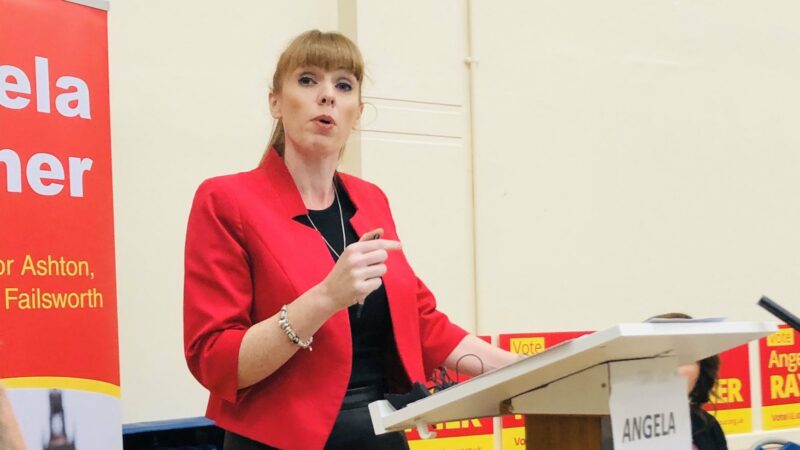
Angela Rayner is urging the government to increase pay for care workers to at least £10 an hour as she says poverty wages in the care sector are not just “morally wrong” but also “holding back our economy”.
In a keynote speech at UNISON Women’s Conference on Wednesday, Labour’s deputy leader is expected to say that a pay rise for social care workers is “well overdue” and the “very least” they deserve after their sacrifices in the pandemic.
Labour analysis shows that increasing social care staff pay to at least £10 per hour would result in rises of up to £3,500 a year, which Rayner will argue would help secure the economy and contribute to the post-Covid recovery.
“Claps didn’t pay the bills last year and it should be a source of shame for Tory ministers that the very same people who have been putting their lives on the line to care for others throughout this crisis are being paid poverty wages that mean they are struggling to support themselves and their own families,” she will say.
“Last year, the Prime Minister and his cabinet fell over themselves to clap for our carers. It’s now well past time for the government to give our care workers, and all of our key worker heroes, the pay rise they deserve to at least £10 an hour.
“It isn’t just morally wrong that so many of our care workers do not earn a wage that they can live on, it is also holding back our economy.
“These pay rises wouldn’t be squirrelled away in an offshore account, every extra pound in the pocket of an underpaid key worker will be spent in local businesses, on their local high street and will help to secure our economy.”
Labour has calculated that increasing pay to £10 an hour for a worker in the sector aged over 25, currently being paid the minimum wage of £8.72, would result in an additional £51 per week or £2,500 per year.
This pay rise increases significantly when considering an employee in the sector aged 21 to 24, currently on the minimum wage of £8.20 per hour, who would benefit from an extra £72 a week or £3,456 annually.
Rayner is also expected to demand urgent action to end the “scandal” of social care workers being paid less than the minimum wage as they are not currently paid for time spent travelling between individual care visits.
The deputy Labour leader will in her speech to trade union members describe the situation as a “disgrace” and call on the government to act immediately to “ensure that social care staff are paid what they are entitled to under the law”.
“It is bad enough that three quarters of our care workers are not being paid the living wage, but it is a disgrace that so many care workers are being exploited and mistreated in this way with their pay packet for the hours they work falling well below even the minimum wage,” she is expected to argue.
“If a care worker works an eight-hour day, they should be paid for an eight-hour day. That is not complicated, and it is not too much to ask for the government to uphold the law.”
A group of care workers in Haringey, north London, were successful in a legal action last year, which ruled that companies commissioned by the council not paying staff for time spent travelling between care visits had broken the law.
Staff in this instance were found to have been working up to 14 hours a day for pay under half the legal minimum hourly rate. Each received around £10,000 in backdated pay that they had been denied by their employer.
Domiciliary, or home, care jobs now account for more than residential care with nearly half a million home care staff in England. Most are employed by private companies and 42% of home care workers are employed on zero-hours contracts.
A report released by Age UK in November warned of a looming recruitment crisis in the sector if conditions do not improve, highlighting that there are 122,000 care sector job vacancies that need to be filled.
The charity raised concerns over low pay and personal protective equipment supply, and exposed a disparity between the way the government has approached support for those working in the NHS and those in the care sector during Covid.
The organisation argued that the 1.65 million people working in care have seen “only relatively limited support put in place” throughout the pandemic with poor access to PPE, testing, mental health support and priority access to shops.
Labour argued at the time that social care workers have been “undervalued and underpaid for too long”, and has repeatedly pushed Downing Street to bring forward a long-term plan for reform of social care.
The health service white paper recently unveiled by Health Secretary Matt Hancock did not address social care and offered no commitment on tackling low pay in the sector. The paper said only that reforms will be announced “this year”.
The Low Pay Commission estimated in 2019 that 420,000 of two million workers paid the minimum wage were not being awarded the proper legal rate. Labour has tried to introduce legislation providing protections for care workers.
Labour MP for Paula Barker was due to introduce legislation to parliament last month but Conservative Commons leader Jacob Rees-Mogg brought a motion to cancel all private members bills.




More from LabourList
Supreme Court trans ruling: Ban on CLPs and branches backing ‘unlawful position’
‘How we can build a strong political centre and centre-left’
‘Building the UK’s best network: delivering digital opportunity for every community’